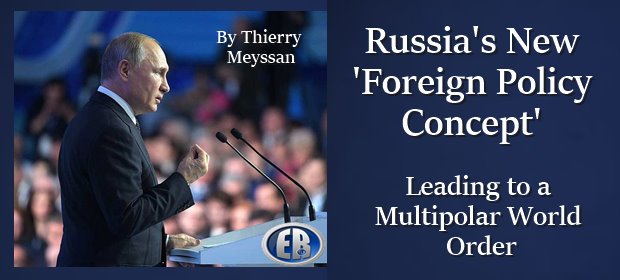
ER Editor: Readers may also be interested in this report from Modern Diplomacy, titled
Geopolitical Changes and the Significance of Russia’s New Foreign Policy Concept
********
How Russia sees its role in building the multipolar world
THIERRY MEYSSAN
Russia has just released its ‘Concept of foreign policy’. After recalling its position in the world, this document describes the end of Western domination and the efforts of the United States and its allies to maintain Washington’s hegemony. It lists the interests and goals of Moscow. It underlines the primacy of contemporary international law (a creation of Tsar Nicholas II) and concludes with a description of the changing world.
This article follows:
1- Middle East frees itself from the West
2- Preparation for a new World War
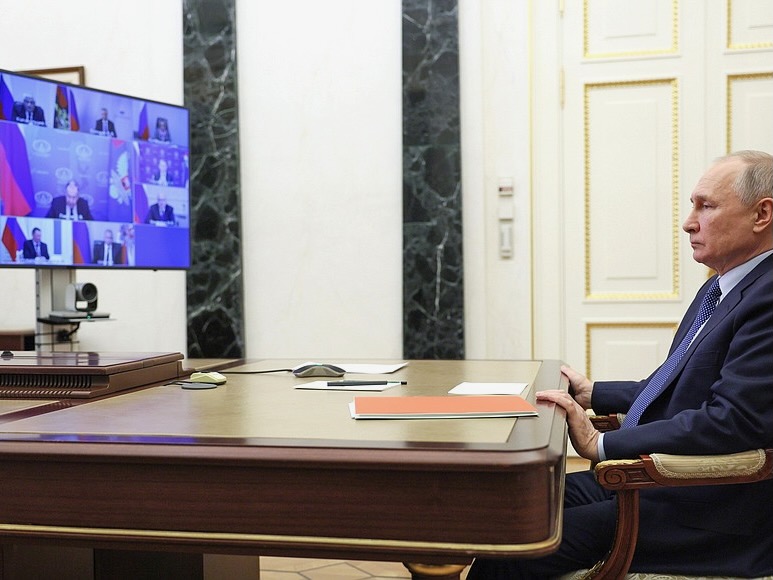
President Vladimir Putin convened his Security Council in videoconference on March 31, 2023. At the end of this meeting, he promulgated an update to the «Concept of Foreign Policy of the Russian Federation».
In this document, Russia sets out its vision of its role in building the multipolar world.
First, Russia recalls its significant resources in all spheres of life, its status as a permanent member of the UN Security Council, its participation in major international organizations and associations, its nuclear powers and its capacity as successor in rights of the USSR. Above all, given its decisive contribution to victory in the Second World War and its active participation in the liquidation of the world system of colonialism, it asserts itself as one of the sovereign centers of world development and considers as its historic mission the maintenance of the global balance of powers and the construction of an international multipolar system.
EVOLUTION OF THE CONTEMPORARY WORLD
Russia observes that the inequitable model of world development, which has ensured for centuries the accelerated economic growth of the colonial powers by appropriating the resources of their colonies, is now a thing of the past.
Attempts are made by the Anglo-Saxons to retain «the natural race of history». A wide range of illegal instruments are used, including the application of «unilateral coercive measures» (abusively qualified as «sanctions»), incitement to State coups, armed conflict, threats, blackmail, etc.
The expression «Anglo-Saxons» is not used in the document. This is a shortcut that I use in the light of the statements of several ministers. Moscow considers that the enemy is above all the United States, but that they have formed a hostile state coalition in which the United Kingdom plays a central role.
As Russia is the largest country in the world, its army cannot defend its borders. It is easy to invade. Throughout history, she has learned to defeat the invaders by using her immense space and climate to her advantage. It certainly fought the armies of Napoleon I and Adolf Hitler, but above all burned its own territory to starve them. In the absence of nearby rear bases, they had to retreat and were completed by the «general Winter». Unlike other countries, the security of Russia therefore implies that no hostile army can amass at its borders.
Considering the strengthening of Russia as a threat to Western hegemony, the United States and its satellites have used measures taken by the Russian Federation to protect its vital interests in Ukraine as a pretext to exacerbate their already long-standing anti-Russian policy, and start a new type of hybrid war. Vital interests include the subordination of the Ukrainian army to the Pentagon after the 2014 coup.
INTERESTS AND GOALS OF RUSSIA
The national interests of Russia are, I quote:
1 ) the protection of the constitutional order, sovereignty, independence, territorial and state integrity of the Russian Federation against destructive foreign influence ;
2 ) maintaining strategic stability, strengthening international peace and security ;
3 ) strengthening the legislative framework for international relations ;
4 ) the protection of the rights, freedoms and legitimate interests of Russian citizens and the protection of Russian organizations against unlawful foreign attacks ;
5 ) the development of a secure computer space, the protection of Russian society against foreign information and psychological influence when it is destructive ;
6 ) the preservation of the Russian people, the development of human potential, the increase in the quality of life and well-being of its citizens ;
7 ) aid for the sustainable development of the Russian economy on a new technological basis ;
8 ) strengthening traditional Russian spiritual and moral values, preserving the cultural and historical heritage of the multinational people of the Russian Federation ;
9 ) environmental protection, preservation of natural resources and environmental management, adaptation to climate change.
The aims of Russia’s foreign policy are, I quote:
1 ) the establishment of a fair and lasting world order ;
2 ) the maintenance of international peace and security, strategic stability, the guarantee of peaceful coexistence and the progressive development of States and peoples ;
3 ) assistance in developing effective complex responses by the international community to common challenges and threats, including regional conflicts and crises ;
4 ) the development of mutually beneficial and equal cooperation in law with all foreign states with a constructive attitude and their alliances, ensuring that Russian interests are taken into account in the framework of the institutions and mechanisms of multilateral diplomacy ;
5 ) opposition to the anti-Russian activity of certain foreign states and their alliances, the creation of conditions for the cessation of this activity ;
6 ) the establishment of good neighborly relations with neighboring States, assistance in the prevention and elimination of hotbeds of tension and conflicts in their territories ;
7 ) assistance to Russian allies and partners for the promotion of common interests, ensuring their security and sustainable development regardless of the international recognition of these allies and partners and their status as members within international organizations ;
8 ) the liberation and strengthening of the potential of multilateral regional associations and integration structures with the participation of Russia ;
9 ) strengthening Russia’s positions in the world economy, achieving the national development goals of the Russian Federation, ensuring economic security, the realization of the economic potential of the State ;
10 ) promoting Russia’s interests in the world ocean, outer space and air ;
11 ) the formation of the objective image of Russia abroad, the strengthening of its positions in the global computer space ;
12 ) strengthening the importance of Russia in the global humanitarian space, strengthening the positions of the Russian language in the world, helping to safeguard historical truth and memory on Russia’s role in world history abroad ;
13 ) exhaustive and effective defense of rights, legal freedoms and interests of Russian citizens and organizations abroad (Russia has always considered itself the protector of Russian culture abroad);
14 ) the development of relations with compatriots residing abroad and the exhaustive assistance to them for the realization of their rights, the protection of their interests and the preservation of the general Russian cultural identity.
RULE OF LAW
Contemporary international law was created at the Hague conference (1899). It was convened by the last tsar, Nicolas II. 27 states participated. It devoted itself to «seeking the most effective means of ensuring for all peoples the benefits of a real and lasting peace». It lasted 72 days.
Three subjects were discussed, but only the last two were successful: limitation of armaments, personnel and military budgets; the establishment of conventions aimed at reducing, in time of war, the use of the deadliest weapons and unnecessary suffering (the Conference adopts the Martens clause, that anything that is not expressly prohibited by a treaty is not allowed. It thus lays the foundations for International Humanitarian Law and will justify the existence of the Nuremberg Tribunal); recognition, for appropriate cases, of the principle of arbitration ( it creates the Permanent Court of Arbitration in The Hague on a French proposal ).
The French delegation stood out. It included Léon Bourgeois, Paul d’Estournelles de Constant and Louis Renault, three future Nobel Peace Prize winners.
This conference posed two innovations:
legal equality between states, whatever they are;
the search for compromise and a unanimous vote as a source of legitimacy.
The method of this conference, which Russia has always respected, constitutes its way of thinking (and that of the French Radicals of Léon Bourgeois). Moscow considers that it finds its current expression in the Charter of the United Nations (1945) and in the Declaration on the Principles of International Law Concerning Friendly Relations and Cooperation among States in Accordance with the Charter of the United Nations (1970).
Opposing international law, defined collectively within the UN, Westerners are trying to substitute a set of ‘rules’, defined by them in the absence of all the others. Only the association of the good faith efforts of the entire international community, based on the balance of powers and interests, can effectively ensure the peaceful and progressive development of large and small states.
In the document of March 31, Russia recalls that its special military operation in Ukraine is authorized by article 51 of the Charter of the United Nations. It refers to the attack planned by the Ukrainian government against the Donbass, of which it has since published one of the annotated texts by the hands of the Ukrainian chiefs of staff. It is therefore understandable that the recognition of the Donbass Republics as independent allied states of Russia ( the day before the special operation ) was a necessary condition for article 51 to apply.
It is a question of establishing contractual relations between the States, knowing that the strongest can always violate its word and destroy the weakest. It must therefore be accompanied by guarantees aimed at discouraging those who are in a position of strength from abusing it. These can only convince if Russia, like the others, has free access to global spaces, including space, and if arms race prevention mechanisms are put in place.
DESCRIPTION OF THE MULTIPOLAR WORLD
Moscow approaches the multipolar world through a cultural vision of the world. It intends to maintain relations with all cultures and encourage each of them to set up intergovernmental organizations.
He claims that if he asks nearby states not to host troops and military bases in hostile states at home, he is available to help them stabilize. Including helping them to quell the destabilization maneuvers undertaken at home by hostile states. It is not for him to watch helplessly other countries follow the Ukrainian path and overthrow elected authorities on the basis of neo-Nazi groups.
The document attaches great importance to strengthening cooperation with China and to coordination with its international action. It is therefore a question of giving birth to a multipolar world, but given birth by two midwives that are Moscow and Beijing. At the military level, Moscow talks about its strategic partnership with India.
A special passage deals with the Islamic world which comes out of Western domination with the victory of Syria and the peace agreement between Iran and Saudi Arabia.
As far as Western Europe is concerned, Moscow hopes that it will realize its mistakes and break away from the Anglo-Saxons. Until then, he is wary not only of NATO, but also of the European Union and the Council of Europe.
Russia does not position itself as an enemy of the West, does not isolate itself from it, has no hostile intentions towards it and hopes that, in the future, Westerners will realize the uselessness of their conflictual policy and will agree with the principles of sovereign equality and respect for mutual interests. It is in this context that the Russian Federation says it is ready for dialogue and cooperation.
Russia’s policy towards the United States is dual, taking into account one side the role of that state as one of the influential sovereign centers of global development, among others, and on the other hand as an essential inspiration, organizer and director of the aggressive anti-Russian policy of Westerners, source of the essential risks for the security of the Russian Federation, international peace, the balanced, equitable and progressive development of humanity.
Source
Featured image source: https://moderndiplomacy.eu/2022/07/14/russia-has-made-a-decisive-break-with-the-west-and-is-ready-to-help-shape-a-new-world-order/

••••
The Liberty Beacon Project is now expanding at a near exponential rate, and for this we are grateful and excited! But we must also be practical. For 7 years we have not asked for any donations, and have built this project with our own funds as we grew. We are now experiencing ever increasing growing pains due to the large number of websites and projects we represent. So we have just installed donation buttons on our websites and ask that you consider this when you visit them. Nothing is too small. We thank you for all your support and your considerations … (TLB)
••••
Comment Policy: As a privately owned web site, we reserve the right to remove comments that contain spam, advertising, vulgarity, threats of violence, racism, or personal/abusive attacks on other users. This also applies to trolling, the use of more than one alias, or just intentional mischief. Enforcement of this policy is at the discretion of this websites administrators. Repeat offenders may be blocked or permanently banned without prior warning.
••••
Disclaimer: TLB websites contain copyrighted material the use of which has not always been specifically authorized by the copyright owner. We are making such material available to our readers under the provisions of “fair use” in an effort to advance a better understanding of political, health, economic and social issues. The material on this site is distributed without profit to those who have expressed a prior interest in receiving it for research and educational purposes. If you wish to use copyrighted material for purposes other than “fair use” you must request permission from the copyright owner.
••••
Disclaimer: The information and opinions shared are for informational purposes only including, but not limited to, text, graphics, images and other material are not intended as medical advice or instruction. Nothing mentioned is intended to be a substitute for professional medical advice, diagnosis or treatment.


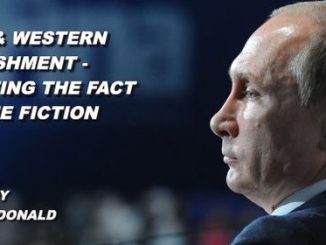
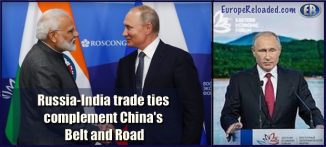
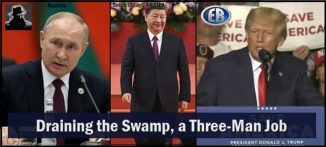
Florian Philippot
@f_philippot
•12h
Le SG de l’OTAN annonce ce soir que « L’Ukraine deviendra un membre de l’alliance » ! Comment s’appelle ce genre de déclaration en pleine guerre ? Mettre de l’huile sur le feu, sciemment ! Pour empêcher tout chemin de Paix et aller vers la 3è guerre mondiale ! #OTANexit vite !
https://twitter.com/f_philippot/status/1643700678395670529
“At the military level, Moscow talks about its strategic partnership with India.”
Clever (same method as de Gaulle).
“As far as Western Europe is concerned, Moscow hopes that it will realize its mistakes and break away from the Anglo-Saxons.”
The Russian hope the People of Europe will take care of their “governments”.